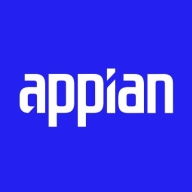


Find out what your peers are saying about Camunda, Automation Anywhere, SAP and others in Business Process Management (BPM).
They see return on investment in terms of cost savings, time savings, more efficient processes, and more efficient employees.
Appian is very efficient, allowing us to build a lot of applications within a financial year, making it cost-effective.
Their customer service is responsive, and the team is very prompt for support.
The technical support for Appian rates as 10 out of 10 because they have a great support team.
The technical support is generally good.
It is a community product, there is not much support we can expect.
The toolset is very intuitive, so we didn’t need to contact their support much.
I never needed support from the platform standpoint, but if additional features are required, we have regular meetings with the product team for feedback.
The technical support from Pega is very low, rating a one or two out of ten.
Pega's technical support team is very helpful.
On a scale of one to 10, Appian rates as a nine for scalability.
Initially, without much coding, I can easily handle five thousand records.
Appian is scalable, but it depends on how you build your applications.
There is no direct scalability option.
If I rate scalability from one to ten, I would probably give it a six.
Currently, big banking providers and insurance providers, even the members for healthcare payers, are using more than millions of operations on a daily or weekly basis.
It depends on how it has been designed and how it has been configured.
The stability of Appian would rate as nine, as it's a stable environment.
It has room to improve for use cases where the users are public facing, where anonymous users could come to a site and run a business workflow or interact with some data.
If there is a very complex process that includes a lot of data transitioning and memory-centric processes, it consumes a lot of memory.
I would like to see more enhancement in the user interface to allow more freedom in designing the sites and pages.
Reporting capabilities can be improved more, and community support should be increased.
For more mature environments, the integration to live systems is lacking, which affects its applicability.
The decision map could be improved to allow more than three options at a decision point.
Pega introduced Constellation, which allows a user to build a more engaging visual experience.
For customer interactions, while the Pega Platform's AI-based decisioning and predictive analytics are great, the Process AI is not very popular yet, as it works on process data rather than customer data.
My learning curve in robotics has been challenging.
On the pricier side, both Appian and Pega are enterprise-level solutions, placing them on the slightly higher side.
The pricing of Appian is based on the number of users and generally ranges from 70 to 100 USD per user per month.
The price of Appian, on a competitive landscape, is a little bit on the higher side for companies, rating maybe a 6.5.
Bizagi's pricing is very aggressive, and it was one of the reasons we chose it.
Pega is priced higher than open-source options like Flowable but is suitable for large-scale industries like banking and insurance.
The pricing is expensive, and this is an issue.
From a licensing perspective, it is higher than the competition.
The zero-code integration feature is remarkable, allowing for ease of data transfer and workflow enhancement.
Appian is aiding in leveraging AI technologies in multiple ways: one way is for developers, as they make development efficient and quick by enabling developer co-pilots across various phases of the application, which helps design Appian quickly and provides suggestions along the way.
It is easy for me to define the process and create configurable workflows.
It is open source.
The user interface is very good, making it easy for business people to understand.
Bizagi has rich functionalities; compared to other BPMN tools, it has more features.
Management capabilities such as dashboards.
Pega Platform is excellent for enterprise-level solutions with integrations to entire systems, including case management, service orchestration, CRM, decision-making capabilities, digital process automation, and AI-driven functionalities.
| Product | Market Share (%) |
|---|---|
| Bizagi | 5.6% |
| Pega Platform | 5.2% |
| Appian | 5.3% |
| Other | 83.9% |



| Company Size | Count |
|---|---|
| Small Business | 20 |
| Midsize Enterprise | 9 |
| Large Enterprise | 41 |
| Company Size | Count |
|---|---|
| Small Business | 42 |
| Midsize Enterprise | 16 |
| Large Enterprise | 36 |
| Company Size | Count |
|---|---|
| Small Business | 9 |
| Midsize Enterprise | 15 |
| Large Enterprise | 68 |
Appian is a unified low-code platform and solution used by businesses to build enterprise applications and workflows. This product adapts to the needs of clients and the technologies they are already using to combine their data in a single workflow and maximize resources. The platform has four main components through which it transforms the work process for companies of various sizes. They are:
Appian is utilized across a diverse set of industries, including automotive and manufacturing, energy and utilities, education, financial services, telecom and media, transportation, retail, insurance, healthcare, and life sciences. The most frequent use cases of Appian are customer journey, governance, risk and compliance, operational efficiency, supply chain, distributed order management, and environmental, social, and governance (ESG) management.
Appian Features
Appian has various features that allow users to create solutions for their businesses. These features can be separated into a few groups according to function, including automation, low-code application development, and integrations and data. Some of the most frequently used features of Appian include:
Appian Benefits
The benefits of using Appian include:
Reviews from Real Users
A practice leader - digital process automation at a computer software company values Appian highly because the product is easy to develop, low-code, and has a good user interface.
Alan G., an advisory board member at Codecon VR, Appian offers a clear application life cycle, easy to learn documentation, and comes with a fundamentals course.
Bizagi’s industry-leading low-code process automation platform connects people, applications, robots, and information. As the most business-friendly and flexible solution on the market, Bizagi enables true collaboration between business and IT, delivering faster adoption and success. Fuelled by a community of 1 million users, Bizagi powers over 1,000 organizations worldwide including Adidas, BAE Systems, and Old Mutual. For more information visit www.bizagi.com
Pega Platform provides flexible business process management with a focus on rapid application development and automation through a low-code approach, enhancing efficiency across sectors.
Pega Platform is renowned for its ability to streamline operations with robust automation features, including robotic process automation and decision-making capabilities. Its intuitive interface and workflow management contribute to a reputation for enhancing business processes. Although users face challenges with integration limitations and high licensing costs, they benefit from rapid deployment and efficient process adaptations. The unified architecture reduces complexity, while case management and integration services support digital transformations in sectors such as banking, insurance, and healthcare.
What are the key features of Pega Platform?In industries like insurance, banking, healthcare, and government, Pega Platform is implemented to automate diverse workflows, supporting initiatives from claims processing to customer onboarding. Enterprises use Pega for case management and digital transformations, valuing its out-of-the-box integrations and real-time reporting capabilities to boost operational automation and enhance customer experiences.